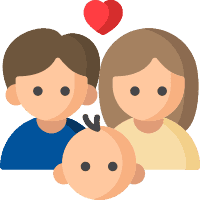Your child is now preschool-age and is maturing into an independent little person. Their physical, emotional, social, and psychological competencies are exploding as they become more self-sufficient.
Progress may start and stop. Some children in this development stage might master skills in one development area and appear to take steps backward in other areas for a short time. This is nothing to be alarmed about as long as your child seems to continue progressing overall and doesn’t appear to lose any skills permanently.
Here are some five year old milestones for your child. Of course, every child grows at their own pace and reaches milestones in their own time. Your child might have already mastered some of these skills before their third birthday, others might take a little longer to reach five year old milestones. If your child hasn’t reached these by their fifth birthday, we suggest contacting your pediatrician for more information.
Movement, Sensory, and Motor Milestones
Between ages three and five, children usually become much more coordinated. Early on, some preschool-age children are so active and full of energy that they might find it easier to use movements instead of a word. For example, they might hop around the room to show you what a frog jumping looks like instead of talking about it.
Mobility
Kids around this age are usually jumping, climbing, hopping, skipping, and running with more coordination. However, occasional tumbles and trips are still perfectly normal.
As your child’s balance improves, you’ll probably notice them displaying their ability to balance on each foot. Most kids in this age range are able to balance on one foot for at least 3-5 seconds and walk across a balance beam (or similar structure).
Kids also develop the ability to kick a ball when it’s rolling toward them. They should also be able to play catch (catching a ball and throwing it back) with at least an 8-inch ball. You may even start to observe them transferring weight forward when they throw a ball.
Games that involve rhythm, movement, and coordination skills are excellent for children in this stage of development.
Sensory and motor skills
Between three and five years of age, most children can complete self-care tasks, like using the restroom independently, including cleaning themselves and washing their hands. While most kids can brush their teeth and bathe themselves without help, parents or caregivers might still need to provide a little quality control supervision. Kids with long hair might also need some assistance washing and brushing their hair.
By age five, kids should be able to dress themselves, and most children learn to tie their shoes towards the end of this age range.
In addition to mastering self-care skills, by age three or four, kids are usually able to begin doing daily chores around the house. Generally, preschoolers can tackle simple, two or three-step jobs. Vacuuming, sweeping, folding washcloths, helping set the table for meals, making their bed, and picking up toys are great, age-appropriate chores that teach life skills and build confidence.
You probably notice your child exhibiting a strong preference for either their left or right hand, especially as they learn to draw and write. A 5 year old milestone is that many kids learn to print their names around this age, and some children begin to write numbers and letters.
Your child’s drawings are probably looking less like scribbles. In this five year old milestone, children should be able to draw a variety of shapes and their drawings usually become more complex. Kids often start to draw people with at least six different parts (legs, arms, feet, head, etc.). When doing arts and crafts, most kids can cut straight lines, circles, and squares with scissors.
Many children enjoy using their imagination and a variety of objects like clay, sand, and other materials to create or build things. By age five, most kids can also build towers with at least ten stacked blocks. These types of activities help develop fine motor skills and stimulate creativity.
Hearing, Language, and Cognitive Development
Children typically have at least 1,500 words in their vocabulary around their fifth birthday! Your child is learning grammar and practicing their new vocabulary by talking and asking questions. It’s helpful for parents and caregivers to read aloud to their children because it helps expand kids vocabulary and language skills.
Speech milestones
Many factors influence language development and every child learns at different rates. Active children, for example, may just be too busy playing to slow down for a conversation!
By age five, most children can speak clearly and use longer sentences of at least five words. Kids are usually able to maintain a meaningful conversation with adults and interact with their peers. By this age, children typically understand about 75% of what they hear.
It’s common for children to talk to themselves and people around them while they play, narrating and guiding what they are doing. You will probably notice your child engaging in a lot of dramatic, imaginative play in which they take on pretend characters.
Most preschool and kindergarten-age kids can use irregular verbs in the past tense correctly (like went and caught), though they might not do it correctly every time. Children also learn how to tell people about personal information like their home city and birth date.
Your child probably listens intently to stories and makes related comments. Many children also enjoy retelling stories, especially while following along with a picture book.
Cognitive Milestones
By age five, most children can recognize numbers up to about ten and often can count to 100. Simple three to ten-piece puzzles are ideal for this age range. They should also be able to match pictures and understand opposites and positional words (like front, middle, and back). Kids usually know the names of several colors, and they may be able to identify some or all of their letters, numbers, and basic shapes.
As your child gets older, their attention span and ability to concentrate on a task improves. You will probably notice them following simple instructions without becoming distracted quite as easily.
Social and Emotional Development
Your kid’s personality will begin to impact their social and emotional behavior. For example, shy children might prefer only one or two friends. In contrast, very outgoing kids might be eager to play and interact with just about anyone.
Regardless of personality, 5 year old milestones for most children include developing more friendships with peers. Some children even have a ?best friend.? Their play becomes more involved as kids start to include rules, props, costumes, and dialogue. They should understand the difference between real life and make-believe.
It’s touching to watch children begin to show affection and sensitivity to other people’s feelings. You might notice your little one displaying great concern and care for smaller children and animals.
Kids in this stage of development tend to have more control over their emotions; however, you might still observe dramatic changes in their attitude. For example, your preschooler may be eager and willing to help at times, then obstinate and unwilling to participate at other times. These emotional swings are usually normal.
Feeding
Your growing child should eat a wide range of foods from all the food groups. They should enjoy a variety of tastes and textures, eating what the rest of the family eats with very few exceptions or substitutions.
It’s normal for kids at this age to join the rest of the family or their siblings for regular meals, eating three healthy meals each day, and one or two snacks if necessary. Most kids can use forks and spoons to feed themselves, and they should be able to drink out of an open cup without spilling.
It’s never too early to start teaching children the value of a healthy, balanced diet. Incorporate a variety of fruits and veggies into meals and snacks. Your pediatrician may recommend cutting back on high-fat foods (like whole milk) as your preschooler’s body requires less dietary fat. However, every child is different. Be sure to talk with your pediatrician before making any dramatic dietary changes.
When to be concerned
Remember, five year old milestones provide a general guideline for when children typically develop specific skills. Every child learns at their own pace, and masters skills on their own timeline. Some children reach developmental milestones earlier or later than others.
Consider speaking to your pediatrician if your child does not appear to be making consistent progress or does not achieve these five year old milestones:
- Speak clearly, and others understand them.
- Able to have a short conversation with an adult or peer.
- Speaks in sentences of at least five words.
- Play and interact comfortably with other children and adults.
- Use the toilet and bathe with little or no help.
Our team of professionals can identify any developmental delays and create an appropriate plan of action to help your child reach the appropriate milestones. Our goal is to provide holistic care for your child and excellent support for caregivers and parents. Contact us today to learn more about our services or to schedule a consultation.


